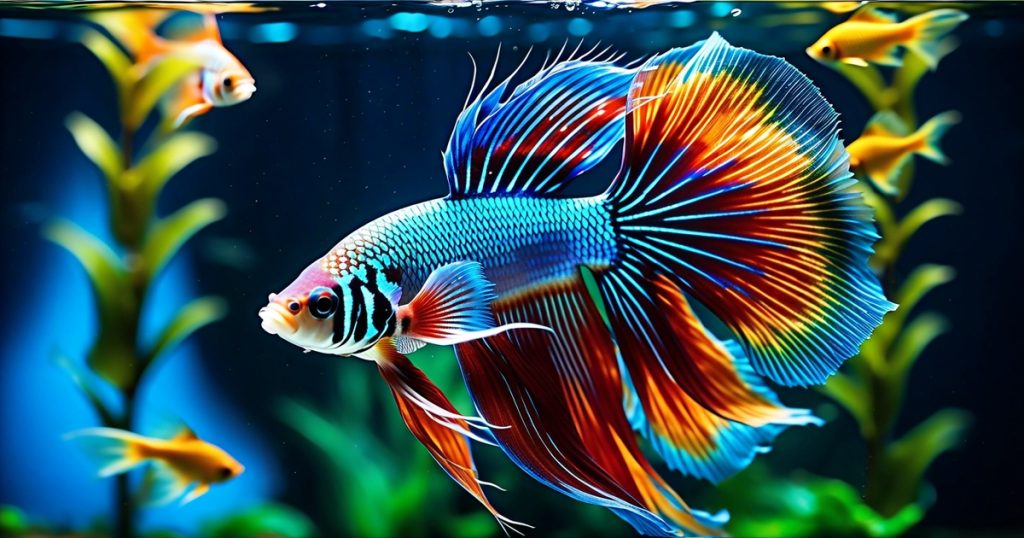Curious about why your betta fish might be showing off its fins in an act of hostility? Understanding the reasons behind this behavior can shed light on your pet’s mood and well-being.
Dive into this post to unravel the mystery behind why bettas flare their gills, exploring possible triggers and how to address this intriguing phenomenon. Stay tuned for expert insights and practical tips on deciphering your fish’s body language and fins.
Table of Contents
ToggleBetta Fish Flaring Behavior

Natural Instinct
Betta fish flare their gills as an instinct. This behavior is ingrained in them from birth. When feeling threatened or challenged, bettas resort to flaring.
Bettas are known for their vibrant colors and long, flowing fins. During flaring, they expand their gills to appear larger and more intimidating than usual. This display is an inherent way for bettas to communicate dominance or establish boundaries with their fins.
Asserting Dominance
Flaring helps bettas assert dominance over other fish in the tank. It’s a way of showing strength and establishing hierarchy within the group. By displaying their full splendor, bettas aim to intimidate potential rivals and maintain control over their territory.
- Pro: Flaring can prevent physical altercations by deterring other fish.
- Con: Constant flaring may stress out your betta fish unnecessarily.
READ: Why is My Betta Fish Twitching? Understanding and Treating Symptoms
Reasons Behind Betta Fish Flaring Their Gills
Perceived Threats
Betta fish may flare their gills when they feel threatened. This behavior is a defense mechanism to intimidate potential predators or competitors. When your betta perceives something as a threat, such as a sudden movement or bright colors, it might respond by flaring its gills.
Betta fish are known for their territorial nature, so any perceived intrusion into their space can trigger the gill flaring response. It’s essential to ensure that your betta has adequate space and hiding spots in its tank to reduce stress levels and minimize instances of aggressive behavior.
Mirror Reflection
Another common reason why betta fish flare their gills is due to seeing their reflection in the tank glass. Bettas mistake their reflection for another fish intruding on their territory, leading them to display aggressive behaviors like flaring.
To prevent excessive flaring caused by mirror reflections, consider placing decorations or plants around the tank walls where your betta frequently sees its reflection. This can help break up the reflective surfaces and reduce the likelihood of triggering this response.
Recognizing Signs of Aggression and Dominance
Aggressive Behaviors
Bettas display aggressive behaviors like flaring, fin spreading, and body posturing. Flaring is when the fish opens its gills wide to appear larger and intimidate perceived threats. It’s a common sign of aggression in bettas.
Aggression can be triggered by various factors such as the presence of other fish, reflections on the tank glass, or even human hands near the aquarium. If your betta is constantly flaring at you or showing signs of hostility towards other fish in the tank, it might be exhibiting aggressive behavior that needs attention.
- Pros: Helps bettas establish dominance in their territory.
- Cons: Prolonged aggression can lead to stress and health issues for your betta.
Dominant Behavior
Dominant bettas may exhibit territorial aggression towards other fish in their environment. They might chase or nip at other tank mates to establish themselves as the alpha fish. Providing ample hiding spots and creating barriers within the tank can help reduce aggressive encounters among fish.
If you notice your betta constantly engaging in fights with other fish or displaying hostile behavior frequently, it could indicate underlying stress factors that need addressing promptly.
- Bettas often show dominant behavior by claiming certain areas of the tank as their own.
READ: How Many Betta Fish in a 3 Gallon Tank? Ultimate Guide
Impact of Flaring on Betta Fish Health
Stress-related Health Issues
Flaring is a natural behavior for betta fish, but frequent or prolonged instances can signal stress. When your betta fish flares its gills excessively, it may be feeling threatened or agitated. This constant state of alertness can lead to heightened stress levels.
- Pros:
- Helps the fish establish dominance.
- Indicates a healthy immune system when done occasionally.
- Cons:
- Prolonged flaring can lead to health issues.
- Overexertion from frequent flaring causes strain on the body.
Weakening Immune System
Overexertion during aggressive displays like flaring puts physical strain on the betta’s body. The energy expended during these moments could otherwise be used for essential bodily functions and overall well-being. Continuous exposure to stressful situations weakens the immune system, making the fish more susceptible to illnesses.
- Monitor your betta’s behavior closely if you notice excessive flaring.
- Create a calm environment by reducing triggers that cause aggression in your fish.
- Ensure proper tank conditions and provide hiding spots for your betta to retreat when stressed.
Creating a Comfortable Environment for Betta Fish
Providing a Comfortable Habitat
Betta fish need an adequately sized fish tank with hiding spots like plants to feel secure. These hiding places give them privacy and reduce stress levels. Ensuring the tank has enough room for your betta to roam around freely is crucial.
Maintaining proper water conditions is essential for your betta’s well-being. Keeping the aquarium clean by regularly cleaning it and monitoring the water temperature is vital. Betta fish are sensitive to changes in their environment, so consistency is key.
Minimizing Triggers for Flaring
Avoid placing mirrors near the tank as they can cause unnecessary stress and trigger flaring behavior in bettas. Reflections from glass or lights can also provoke this response, so be mindful of where you position the tank within your home. By creating a serene environment with minimal disturbances, you can help reduce instances of gill flaring in your beloved betta fish.
Addressing Stress in Betta Fish
Consistent Feeding Schedule
Maintaining a consistent feeding schedule is crucial for reducing stress in betta fish. Feeding them at the same time every day helps establish a routine that they can rely on. Overfeeding or underfeeding can lead to health issues and cause unnecessary stress.
To reduce the chances of your betta flaring its gills, feed it small portions of high-quality food once or twice a day. Uneaten food should be removed promptly to keep the tank clean and prevent water contamination.
Minimize Disturbances
Minimizing loud noises and sudden changes in lighting around your betta’s tank area are essential for creating a peaceful environment. Loud sounds can startle bettas, causing stress and making them more likely to flare their gills as a defensive response.
Ensure that the tank is placed in a quiet area away from high-traffic zones to minimize disturbances. Avoid tapping on the glass or making sudden movements near the tank, as this can also trigger stress responses in your betta.
READ: How Do Betta Fish Disappear?
Managing Betta Fish Territorial Instincts
Separate Bettas
To prevent conflicts, house betta fish separately in individual tanks. This ensures each betta has its own space without feeling threatened.
Bettas are known for their territorial behavior and can become aggressive towards other fish, especially males. By providing separate tanks, you reduce the chances of territorial conflicts.
- Individual tanks prevent fights
- Each betta has its own territory
Use Tank Dividers
For those with limited space or multiple bettas, tank dividers are a great solution. These dividers create separate spaces within one aquarium.
Tank dividers allow you to keep several bettas in the same tank while maintaining boundaries between them. This setup minimizes aggression and stress among the fish.
Benefits of Betta Fish Flaring Behavior
Muscle Exercise and Health Improvement
Flaring exercises a betta fish’s muscles, similar to how we stretch or flex our bodies. This movement helps in keeping the fish healthy by preventing muscle atrophy. Regular flaring can lead to stronger fins and a more robust body.
Flaring allows bettas to show off their strength and establish dominance in their environment. By puffing up their gills, they signal other fish about their presence and assert their territorial boundaries. This behavior is natural for bettas as they try to protect their space from potential threats or competitors.
Entertainment for Fishkeepers
For fish enthusiasts, observing a betta fish flare its gills can be quite an entertaining experience. It’s like watching a mini underwater performance where the vibrant colors of the betta intensify during this display. The intricate movements and intense focus during flaring make it captivating for those who care for these beautiful creatures.
Summary
You’ve learned why your betta fish might flare its gills, from asserting dominance to feeling threatened. Understanding these behaviors can help you create a safe and comfortable environment for your fish. By recognizing signs of stress and addressing them promptly, you can ensure your betta remains healthy and happy. Remember, a well-cared-for betta is a vibrant betta!
Now that you’re equipped with the knowledge to decode your betta’s behavior, take action to enhance their well-being. Implement the tips shared here, observe your fish closely, and make adjustments as needed. Your attentive care will not only foster a thriving environment for your betta but also deepen the bond between you and your aquatic friend.
More About Betta Fish
- Why Is My Betta Fish Turning Black? Causes & Solutions
- Why Is My Betta Fish Hiding Behind the Filter? Behavior & Solutions
- Why Did My Betta Fish Disappear? Common Reasons
